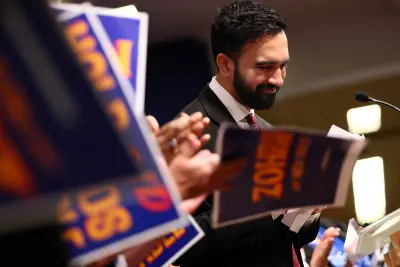Zohran Mamdani Shows Democrats How Not to Take the Bait

Zohran Mamdani receives the endorsement of the United Federation of Teachers in New York City on July 9, 2025.Photo: Michael M. Santiago/Getty Images Zohran Mamdani’s shocking victory in the Democratic primary for mayor of New York City was not just a win over former New York Gov. Andrew Cuomo, but also over a set of Islamophobic smear tactics that have become all too familiar — and will continue to dog him in the run-up to November. In the days before the primary, Mamdani was asked repeatedly about the slogan “globalize the intifada” on the assumption that because he has spoken out against Israel’s ongoing genocide in Gaza, he should have to answer for the protest cry. He said that he had not used it himself, but he didn’t cede rhetorical territory to the political establishment by condemning the phrase. Rather than take the bait, Mamdani made clear that many take “globalize the intifada” as a call to demand Palestinian equal rights, and that he doesn’t see it as his role to police speech. Mamdani, who grew up in New York City and was just shy of 10 years old on September 11, 2001, may well have heard in the question the same ominous soundtrack that has haunted Arab and Muslim people in the United States for decades — and reached a fever pitch after the 9/11 attacks. We have watched bad faith actors routinely demonize Arabic language and Islam day in and day out. Lost all too often is any grasp of what the language actually means. What Does “Intifada” Mean? As an Arabic speaker, I can delve into the linguistics. In Arabic, just as with its semitic sibling Hebrew, words are largely derived from three-letter roots. These three-letter roots then act as building blocks for a wide range of associated words, and they are modified into 10 different awzan, or patterns, to create transitive, causative, passive, and reflexive forms of the root. The root n-f-d is the verb “to shake” or “to shake off.” Think of tapping the ashes off the end of a cigarette or shaking the dust out of an old rug. One of the awzan of the root that converts it into its passive form is iNtiFaDa, which means “a shaking off.” When this word is used to describe a singular historical occurrence, it means a popular uprising — in other words, a peoples’ shaking off of oppression. This is not only the meaning of the word in a Palestinian context. Arabic language texts discussing various uprisings across history, and on any continent, would use the word intifada because that is simply what the word means. This exercise feels at once obligatory and unnecessary. What is at issue here is not simply what the word means, but who gets to define its meaning and who gets to have their intentions and the validity of their concerns defined by others. This fundamental dynamic, which is an all-too-common theme in a post-9/11 America where Islamophobia and anti-Palestinian racism shape so much of our discourse, is precisely what Mamdani was refusing to play along with — and good on him for it. Read our complete coverage Chilling Dissent Of course, intifada is but one example of this. Whether it is English-language phrases or slogans like “from the river to the sea, Palestine will be free,” or Arabic-language words or phrases that are constantly defined as suspicious or threatening, the words’ actual meanings and their speakers’ genuine intentions end up being far less important than how bad faith actors with larger platforms want them to be understood. An Era of Being Exogenously Defined On a nightly basis after September 11, 2001, so-called terrorism experts who knew next to nothing about the language, religion, or cultures of the region would appear on news broadcasts — indoctrinating our friends, neighbors, classmates, and coworkers to treat our language as suspicious. We watched as those subtle and innocent nuances of our tongue were twisted into indicators of suspicion. I remember hearing an Arab-American elder once explain to a curious neighbor, “In Arabic, God is in every conversation.” At the time, I thought it was a bit overdramatic. It is undoubtedly true that it is hard to imagine an Arabic conversation where Allah is not uttered. Whether in our bismillahs, alhamdulillahs, mashallahs or inshallahs or our yallahs or wallahs, God makes routine appearances. But these are not necessarily religious conversations at all. Even the non-religious use these terms; it is just the nature of how we communicate in our language due to its historic ties to faith. It is also one of the many things that makes the Arabic language beautiful. And yet we watched as those subtle, innocent, beautiful nuances of our tongue were twisted into indicators of suspicion. In an American discourse so heavily imbued with anti-Palestinian racism and so rife with Islamophobia, Palestinians or those who dare see them as human are not allowed to have legitimate intentions or legitimate grievances. They are to be constantly seen as suspicious. Even if they speak of human rights, equality, dignity, they can never really be trusted to mean those things because of who they are — sneaky shapeshifters with deeply held, murderous, ulterior motives. It is quite remarkable how much this echoes antisemitism throughout history, and that should surprise no one. All forms of racism are connected. A Shoe on the Other Foot Imagine for a minute subjecting words or phrases in a different language, or about a different people, to the same unfair treatment. Consider the Hebrew phrase Am Yisrael Chai. The literal meaning of the phrase is “the people of Israel live,” and there are plenty of instances where the use of this phrase is mundane. However, the phrase is routinely chanted by murderous Israeli settlers as they engage in mob violence against Palestinians living under Israeli occupation. Recently, it has been shouted by Israeli soldiers as they commit heinous war crimes in Gaza and shared widely and proudly by those same soldiers on social media. Thus, one could argue that Am Yisrael Chai is a genocidal slogan and must be banned, and that all those who use it or have used it must be criminalized and viewed with deep suspicion. Surely, this is absurd. And yet this is the absurdity Palestinians and those who support their freedom are constantly subjected to. Still, too many cannot see the glaring double standard. In her raving Islamophobic diatribe against Mamdani, for which she has since sort of apologized, Sen. Kirsten Gillibrand of New York accused Mamdani of calling for “global jihad.” This is, of course, not something Mamdani ever did, but accuracy has never been the hallmark of these sorts of smears. Gillibrand is not alone in this, but representative of a political class where the erasure of Palestinian security is normalized. More revealing, though, were other parts of Gillibrand’s comments. Referring to “globalize the intifada” she said, “It doesn’t matter what meaning you have in your brain, it is now how the word is received. When you use a word like intifada, to many Jewish Americans and Jewish New Yorkers, that means you are permissive for violence against Jews.” She went on to explain that if you “talk to our LGBT community, you talk to our Black community, you talk to our Hispanic community, there are words and there are imagery and there are things that are said that they will hear and feel it as a dagger to their throat.” Here Gillibrand shows she is capable of thinking about how words are received by other communities. But her choice of examples leaves one wondering: Has she ever thought about how people in the Palestinian, Arab, and Muslim communities receive certain words or imagery? How does Gillibrand think these communities hear her Islamophobia? How does she think we receive the ritual regurgitation of phrases like “Israel has a right to exist as a Jewish state” — which, to Palestinians, means that Israel has a right to ethnically cleanse us and deny us rights and equality. Related How Andrew Cuomo Could Become NYC Mayor — Even if Zohran Mamdani Wins How our communities receive things doesn’t seem to matter much to Gillibrand, and it is probably easier to just pretend we do not exist — especially when the top contributor to her campaign in the last five years was the American Israel Public Affairs Committee, which gave her nearly half a million dollars between 2019 and 2024. Gillibrand is of course not alone in this, but rather representative of a political class where the erasure of Palestinian concerns and security is entirely normalized. Not all throats are created equal. Good Bye to All That It feels as if Mamdani’s election victory is a turning point away from the dominance of that very political class. He could have played the game exactly as they did. Condemn the phrase and those who say it, just as Gillibrand and others would have wanted him to. He would have been wrong to do so if he did. Not only would it reinforce the very policing of Palestine-related speech that is at an all-time high at this moment, but it also wouldn’t have helped him politically at all. There is nothing Mamdani can say that would silence the bad faith actors losing their minds over a Muslim millennial socialist’s obvious edge in the New York City mayoral race. Most of them are purely interested in trying to maintain a quickly evaporating pro-Israel consensus. If Mamdani condemned the phrase, they would say he is being deceptive and demand he condemn something else, forcing him to choose between perpetually being on the defensive or perpetually appearing to equivocate. Perhaps worse, he’d be selling out the very voters who made the foundation of his campaign. This is not to say that most Mamdani voters use the phrase “globalize the intifada.” I’d bet many had never heard it before the last few weeks. But I do think they are capable of identifying bad faith smears aimed at taking down candidates that challenge the establishment. That’s why the smears aimed at Mamdani didn’t just fail, they backfired. Related N.Y. Dems Face Choice Between Voters’ Chosen Candidate and Disgraced Adams, Cuomo Mamdani’s campaign represented several things at the same time: a break from the cynicism that has dominated our politics, a political underdog aiming at the very centers of power, and a youthful turn away from the politics of an older generation of leaders. To condemn the phrase would signal a betrayal of the principles his campaign represented. But Mamdani isn’t just standing up for what he believes in; he is also reading the political winds correctly. The Democratic electorate today looks very different on the issue of Palestine than it did back in 2009, when Gillibrand was first elected to the Senate. CNN’s Harry Enten summed up the sea change recently as he discussed polling data on views toward Israelis and Palestinians. Democrats overwhelmingly sympathize with Palestinians over Israelis today. Some of us have been identifying this shift for years, but it is more pronounced today than ever before, and there is likely more to come. The Israeli government’s rightward shift and the exposure of its constant abuses against Palestinians have driven this turn for years. But the last 21 months of Israel’s genocide in Gaza are unlike anything we have ever seen. If the 1967 war implanted the image of Israel as the underdog against the Arab Goliath in the American mind, Israel now as the genocidal criminal in Gaza will be one of the defining ideas for an entire generation of Americans and will shape their views about Israel for decades to come. And Americans are not merely tired of seeing the horrors the Israeli military is inflicting on the civilians of Gaza — they are also increasingly tired of being told they are antisemitic for speaking up about it. As public opinion shifts, efforts to maintain a pro-Israel U.S. policy will increasingly involve repression and policing that will only seem more ridiculous and desperate over time. Voters who have shifted significantly on Israel will angrily wonder why their elected representatives echo pro-Israel lobby groups more than their own constituents. In short, Mamdani’s politics will be seen as more welcomed and more authentic among Democratic voters than those of the Gillibrands or Cuomos of the world. It’s about time that more politicians took a note from Mamdani: Stop taking the bait. The post Zohran Mamdani Shows Democrats How Not to Take the Bait appeared first on The Intercept.


